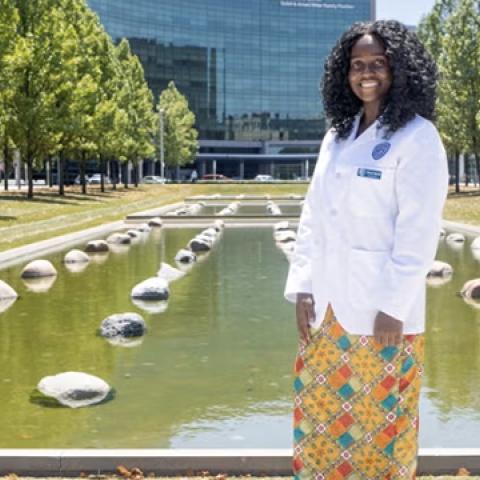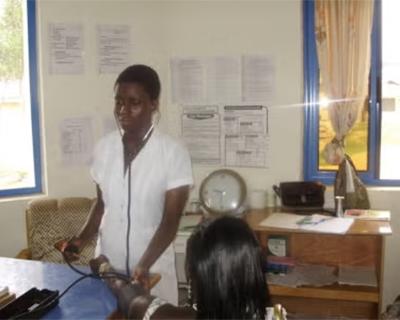It only took an instant for all of Akua Abrah’s career ideas to shift. Peering into the eyes of an infant at an orphanage in Ghana, she tossed aside her aspirations of becoming a veterinarian—inspired by repeated viewings of Eddie Murphy’s Dr. Doolittle. Though she had yet to hear the word “neonatologist,” she knew that she wanted to spend her life caring for the smallest of patients.
Originally from Ghana, Abrah spent much of her childhood living in the United States. Her encounter with that infant sparked many questions for then-17-year-old Abrah. She pondered the social and systemic factors that influence pediatric care—questions she still seeks to answer. Now a fourth-year student at Cleveland Clinic Lerner College of Medicine of Case Western Reserve University, Abrah will return to Ghana with a Fulbright-Fogarty Fellowship in Public Health in search of solutions.
“I’m really happy about this opportunity,” said Abrah, who is an Andrew B. Kaufman World Medicine Pathway Scholar at the School of Medicine focused on global health.
Combatting infant mortality
Her nine-month Fulbright experience will be her longest period of time spent in Ghana since her family moved to the Annapolis, Maryland, area at age 6, and her first opportunity to visit the country’s Ashanti region.
Abrah will travel to Kumasi, Ghana, in the Ashanti region to work with the Suntreso Government Hospital. There, she will conduct a screening study of glucose-6-phosphate dehydrogenase (G6PD) deficiency, a common but potentially serious condition that can cause a deadly increase of bilirubin in newborns. Sub-Saharan Africa has the highest burden of neonatal jaundice-related morbidity and mortality globally, and the prevalence of G6PD deficiency is estimated to be between 7 and 20% in Ghana.
The World Health Organization suggests nationwide screening protocols in countries where the prevalence is above 5%. Ghana has not yet adopted such a practice, and while jaundice is common around the world, many health facilities in Ghana are not equipped with the phototherapy devices to treat it.
Through her Fulbright project, Abrah will partner with the Northern Pacific Global Health Research Fellows Training Consortium to screen newborns for G6PD deficiency and follow them over a 28-day period after their birth to monitor for jaundice-related complications. In addition to providing parents with educational materials about the condition, she will assess the cost-effectiveness of including G6PD deficiency screening into routine neonatal care across Ghana.
A key priority of Abrah’s work is engaging with community leaders to gain their insights into the feasibility of such a program. She and her collaborators will meet with key stakeholders, including local government leadership, community members, doctors, nurses, town leaders and more.
Going home
As an undergraduate student majoring in anthropology, Abrah conducted ethnographic research in the Eastern Region of Ghana on natal care. This allowed her to conduct participant observation and live among the people she was studying. Though she was in her mother’s hometown of Osiem, she initially felt like a foreigner. But by connecting with her extended family and immersing herself in the community through shared meals, conversations, dance, church, and more, she gradually found a deep sense of connection and belonging .
During her Fulbright project, she hopes to do the same, on an even deeper level. As a classically trained violinist, she hopes to perform with the local symphony to share what she’s learned and strengthen the skills of the young musicians, but also to learn more about classical and traditional Ghanaian music, instrumentation and composers.
At the conclusion of her Fulbright project, Abrah will return to Cleveland to complete the final year of her medical training. This won’t be her last visit to Ghana, though. She aspires to practice neonatology in both the United States and in resource-limited settings across sub-Saharan Africa.
“I think it’s going to be a great learning experience for me, both in healthcare and global health research,” she said. “I’m looking forward to really being immersed in the community and just soaking it all in.”



